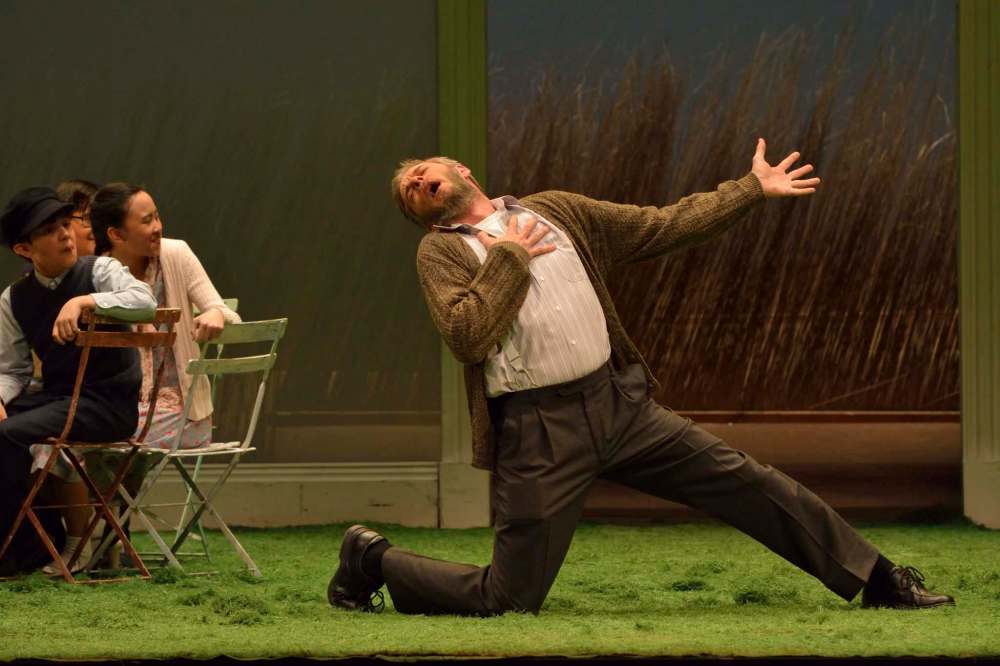Slow-burn approach to plot-thin opera Werther showcases soaring voices
Advertisement
Read this article for free:
or
Already have an account? Log in here »
To continue reading, please subscribe:
Monthly Digital Subscription
$19 $0 for the first 4 weeks*
- Enjoy unlimited reading on winnipegfreepress.com
- Read the E-Edition, our digital replica newspaper
- Access News Break, our award-winning app
- Play interactive puzzles
*No charge for 4 weeks then billed as $19 every four weeks (new subscribers and qualified returning subscribers only). Cancel anytime.
Read unlimited articles for free today:
or
Already have an account? Log in here »
Hey there, time traveller!
This article was published 30/04/2017 (2551 days ago), so information in it may no longer be current.
If opera ultimately is about “bel canto” — beautiful singing — then one need not look any further than Manitoba Opera’s company première of Massenet’s Werther, a lushly scored portrait of an artist as a young man that showcases a powerfully strong cast of principal artists. Notably, all are also marking their own role debuts, as is this the first Massenet opera staged by the 44-year organization.
The nearly three-hour (including two intermissions) production directed by Ann Hodges opened Saturday night at the Centennial Concert Hall, with two more performances slated for this evening and Friday.
Based on Goethe’s German-Romantic tale The Sorrows of Young Werther, and sung in French with English surtitles, its skeletal plot of boy meets girl; boy loses girl; boy dies is opera at its compact best.
Preferring not to gild the lily with convoluted (albeit operatic) twists and turns, it delves more deeply into the hearts and minds of its ill-fated characters, underscored by Massenet’s stunningly gorgeous music brought to life by maestro Tyrone Paterson leading the Winnipeg Symphony Orchestra.
Essentially, young poet Werther falls madly in love with Charlotte, who carefully tends to her seven younger siblings after their mother dies. After he discovers she is betrothed to successful businessman Albert, he spirals into dark depression, finally taking his own life in a harrowing finale.

Internationally renowned for his soaring tenor voice, Edmonton-born John Tessier in the title role can only be described as a Canadian treasure.
Last appearing onstage as Tonio in Manitoba Opera’s 2012 production of Donizetti’s The Daughter of the Regiment, he spun every lyrical phrase like fine gold, first heard during his opening aria O Nature, pleine de grâce, performed with utter ease and capped by ringing high notes.
His showstoppers: Lorsque l’enfant revient d’un voyage, in which Werther first contemplates suicide, and later, goose-bump inducing delivery of Pourquoi me reveiller elicited well-deserved, spontaneous applause with cries of bravo for the charismatic singer.
South African/Canadian mezzo-soprano Lauren Segal also created a flesh-and-blood Charlotte, an “angel of duty,” with her acting skills revealing her character’s inner turmoil, climaxing with one final “Ah!” after Werther dies that emanates as a shriek from her soul.
Segal’s rich vocals also resonated during her third-act Va! Laisser couler mes larmes, that grew in dramatic intensity as she realizes the poet’s self-destructive intentions.
Winnipeg-based soprano Lara Secord-Haid’s sparkling portrayal of Charlotte’s younger sister Sophie captured the impetuous optimism of youth, as she skipped and flitted about the stage with her effervescent coloratura, including quicksilver runs, displayed during Du gai soleil, plein de flame.
But she also crafted her 15-year-old character with subtle nuance, and when she sobs uncontrollably after Werther departs in the second act, she created fascinating sub-text for her own tragic tale of love and loss.
Albert, performed by American baritone Keith Phares is solid and true, besotted with his wife, with his resonant voice clearly projecting while providing steady ballast to Werther’s eloquent arias.

The cast also includes Le Bailli — a.k.a. the Magistrate — performed with gravitas by baritone David Watson, and his whisky-swilling village sidekicks, Johann (baritone Howard Rempel) and Schmidt (tenor Terence Mierau).
Despite all the grand singing, the production itself is uneven. The fundamentally plot-shy opera that premièred in 1892 poses tricky problems of pacing, calling for hard choices needing to be made regarding both individual and relational emotional trajectories. Hodges opted for a slow-burn approach, allowing Werther’s love for Charlotte to first smoulder like ashes during the first two acts, before finally erupting into flames in the third.
When the poet (with his vaguely “preppie” trousers and knit vest not helping) arrives to escort Charlotte to the dance in the first act, their encounter proves more polite than passionate. His understated reaction to hearing of Charlotte’s impending nuptials also did not clearly read, despite his later, angst-ridden “Un autre est son époux!”
At his core, Werther is a hothead, and he often appeared overly restrained until his final scenes, when Tessier unleashed his full dramatic power.
Still, other artistic choices prove effective, including the addition of a prologue, where we witness the death of Charlotte’s mother. This establishes the opera’s overall themes, while also providing her motivation for remaining stonily resistant to Werther’s ardent declarations of love.
The 1920s-styled set, on loan from Opéra de Montréal, is striking in its simplicity, engendering intimacy while also imbuing the show with fresh appeal.
Nevertheless, it still plays havoc with sightlines, with patrons seated on the side of the hall not always able to clearly see the full stage.
Despite some of the production’s flaws, the opening night audience of an estimated 1,700 leapt their feet during the final curtain call, with more cheers of bravos for the star-crossed lovers.
holly.harris@shaw.ca



